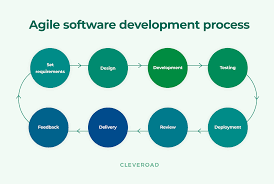Empowering Innovation: The Role of a Software Development Firm in Today’s Tech Landscape
The Role of a Software Development Firm in Today’s Tech Landscape
In today’s digital age, software development firms play a crucial role in shaping the technological landscape. These firms are responsible for creating innovative software solutions that drive businesses forward and enhance user experiences.
What Does a Software Development Firm Do?
A software development firm specializes in designing, developing, and maintaining software applications tailored to meet the specific needs of their clients. These firms employ skilled developers, designers, project managers, and quality assurance professionals who work together to deliver high-quality software products.
Key Services Offered by Software Development Firms
Software development firms offer a wide range of services to cater to diverse client requirements. Some of the key services include:
- Custom Software Development: Developing bespoke software solutions tailored to meet the unique needs of each client.
- Mobile App Development: Creating mobile applications for iOS and Android platforms to reach a wider audience.
- Web Development: Designing and developing websites that are visually appealing and functionally robust.
- Software Maintenance and Support: Providing ongoing maintenance and support services to ensure smooth operation of software applications.
- Quality Assurance Testing: Conducting rigorous testing to identify and fix bugs or issues in software products before deployment.
The Impact of Software Development Firms on Businesses
Software development firms empower businesses by providing them with cutting-edge technology solutions that streamline operations, improve efficiency, and enhance customer engagement. By leveraging the expertise of these firms, businesses can stay ahead of the competition and adapt to rapidly evolving market trends.
The Future of Software Development Firms
As technology continues to advance at a rapid pace, the role of software development firms will become even more critical. These firms will need to stay abreast of emerging technologies such as artificial intelligence, blockchain, and Internet of Things (IoT) to deliver innovative solutions that meet the evolving needs of their clients.
In conclusion, software development firms serve as catalysts for digital transformation and innovation across various industries. Their expertise and commitment to excellence make them indispensable partners for businesses looking to thrive in today’s tech-driven world.
6 Essential Tips for Building a Successful Software Development Firm
- Focus on building a strong and talented team with diverse skills and expertise.
- Prioritize clear communication among team members to ensure smooth collaboration.
- Adopt agile methodologies to improve flexibility and responsiveness in project development.
- Invest in continuous learning and development for employees to stay updated with the latest technologies.
- Maintain high coding standards and conduct regular code reviews to ensure quality of software products.
- Listen to client feedback actively and incorporate it into your software development processes for better outcomes.
Focus on building a strong and talented team with diverse skills and expertise.
To thrive in the competitive landscape of software development, it is crucial for a software development firm to prioritize the cultivation of a robust and skilled team with diverse talents and expertise. By assembling a team with varied skill sets and backgrounds, the firm can leverage a wide range of perspectives and innovative ideas to tackle complex challenges and deliver exceptional solutions. A diverse team not only fosters creativity and collaboration but also ensures that the firm is equipped to adapt to evolving technologies and meet the dynamic needs of clients effectively.
Prioritize clear communication among team members to ensure smooth collaboration.
Effective communication is essential for the success of a software development firm. Prioritizing clear communication among team members is key to ensuring smooth collaboration and project execution. By fostering open and transparent communication channels, team members can share ideas, address challenges, and align on project goals more effectively. This practice not only enhances teamwork but also helps in mitigating misunderstandings and streamlining the development process, ultimately leading to successful outcomes for the firm and its clients.
Adopt agile methodologies to improve flexibility and responsiveness in project development.
Adopting agile methodologies is crucial for software development firms seeking to enhance flexibility and responsiveness in project development. By embracing agile practices such as iterative development, frequent collaboration with stakeholders, and adaptive planning, firms can quickly respond to changing requirements and market dynamics. This approach not only improves the quality of deliverables but also fosters a more efficient and transparent project management process, ultimately leading to greater client satisfaction and successful project outcomes.
Invest in continuous learning and development for employees to stay updated with the latest technologies.
To ensure the success and relevance of a software development firm in today’s fast-paced industry, it is crucial to invest in continuous learning and development for employees. By providing opportunities for ongoing training and upskilling, employees can stay updated with the latest technologies, trends, and best practices in software development. This commitment to learning not only enhances the skills and knowledge of the team but also enables the firm to deliver innovative solutions that meet the evolving needs of clients and stay competitive in the dynamic tech landscape.
Maintain high coding standards and conduct regular code reviews to ensure quality of software products.
To maintain the quality of software products, it is essential for a software development firm to uphold high coding standards and conduct regular code reviews. By adhering to established coding guidelines and practices, developers can ensure consistency, readability, and maintainability of the codebase. Code reviews provide an opportunity for team members to collaborate, identify potential issues early on, share knowledge, and ultimately enhance the overall quality of the software being developed.
Listen to client feedback actively and incorporate it into your software development processes for better outcomes.
Listening to client feedback actively and integrating it into your software development processes is paramount for achieving successful outcomes. By valuing and implementing client input, software development firms can ensure that their solutions align closely with the needs and expectations of their customers. This approach not only enhances the quality of the final product but also fosters stronger client relationships built on trust, collaboration, and a shared commitment to delivering tailored and effective software solutions.




